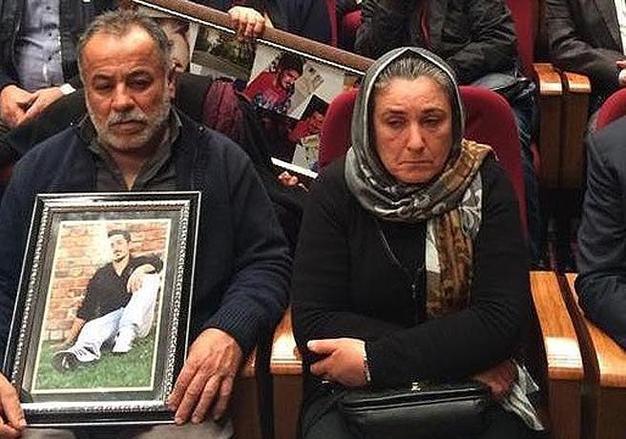Policeman singled out as main suspect in Gezi victim case, faces life imprisonment
İsmail Saymaz KAYSERİ

Emel and Şahap Korkmaz grieve their son during the hearing into Ali İsmail Korkmaz's murder Nov. 26 in the Kayseri courthouse. DHA Photo
The trial into the murder of Ali İsmail Korkmaz during last year’s Gezi protests entered a new phase Nov. 26, with the prosecutor singling out just one of the police officers who beat the young student as the case’s main suspect, demanding life imprisonment.
The prosecutor said the policeman, identified only as M.S., administrated the last three kicks to Korkmaz’s face and chest, according to the security footage that recorded the incident, charging him with first-degree murder.
A second officer, identified as Y.A., will face between 12 and 16 years in prison for “deliberately injuring” Korkmaz, while prosecutors asked for the acquittal of two other policeman standing trial as suspects due to a “lack of evidence.”
Korkmaz became one of the symbols of the nationwide protests after footage showing the deadly beating by plainclothes police in Eskişehir emerged in the media, sparking outrage and prompting more people to join the demonstrations. The 19-year-old died after spending 38 days in a coma due to injuries he sustained during the beating as protesters across the country closely followed his convalescence.
Prosecutors also asked for between eight and 12 years in prison for four other suspects, all local shopkeepers working at a bakery in front of which Korkmaz was attacked, for their involvement in the beating.
Lawyer asks for punishment of ‘chiefs’Gürkan Korkmaz, the Gezi victim’s older brother who is also acting as the lawyer for the family, slammed the singling out of just one of the suspects and the demand for an acquittal of two police officers whom he designated as the hierarchically superior “chiefs.”
“Demanding the acquittal of police chiefs who ordered the capture of [Korkmaz] is contrary to the penal code. This may have been overlooked by the prosecutor,” he said, stressing that M.S. was only seen administrating the last blows.
“Apart from the first-degree murder charge against the individual who propitiated the last three kicks, the other suspects are being protected,” Gürkan Korkmaz said.
Korkmaz’s family also took the floor during the hearing. The father, Şahap Yılmaz, said each one of the suspects played a part in his son’s killing. “They are attacking someone who didn’t do them any harm. There is no reason not to call them all murderers. We want a real sentence,” he said.
For her part, the victim’s mother, Emel Korkmaz, again made an emotional statement, asking for the strongest punishment possible.
“I lost my son 18 months ago. I cannot hear his breath or voice, but meanwhile I have had to face his murderers five times. You will live the rest of your life being labeled as murderers. As for me, I am proud of my son. I know that even if they are sentenced to death, this wouldn’t bring my son back. But if there is justice in this country, I want them to be tried in the heaviest possible way,” she said.
Main suspect: I was assigned to suppress a coupThe suspects
denied the accusations despite footage and other evidence. The key
suspect, M.S., even denied that the victim he attacked was Korkmaz,
adopting the curious defense that the person his group hit with sticks
was “much taller.”
During the Nov. 26 hearing, the main suspect of the case rejected responsibility for Korkmaz’s death and demanded to be acquitted, arguing that he took part in the suppression of a “coup” targeting the government.
“The president, the prime minister and the interior minister of this country say Gezi Park was a coup. If it was a coup, I was assigned to suppress it,” M.S. told the court.
President Recep Tayyip Erdoğan, who was prime minister at the time, had rejected criticism of the police’s brutal crackdowns on protests, even describing the police’s behavior during the protests as a “heroic saga.”
Concurrently speaking at an event in Ankara Nov. 26,
Erdoğan said, "When necessary, shopkeepers are also soldiers, fighters,
heroes, police and judges" in coincidental but apparent support for
shopkeepers to take the law into their own hands.
M.S.'s lawyer, Mutlu Karayılan, also claimed that M.S. “obeyed orders,” urging the court to take the testimonies of the Eskişehir governor and police chief, as well as higher officials.
“The Eskişehir police chief, the governor, the interior minister and the prime minister should be included in the trial and their testimony should be collected. My client only fulfilled the instructions he was given,” Karayılan said.
He also again expressed his doubts that the person seen beaten in the video footage was Korkmaz.
The trial itself has also drawn controversy as it was moved from the western Turkish city of Eskişehir, where Kormaz was studying and the incident took place, to the Central Anatolian town of Kayseri in a move that civil rights activist saw as a way to manipulate the judicial process and ensure the trial occurred in a more conservative province.
Five protesters – Mehmet Ayvalıtaş, Abdullah Cömert, Ethem Sarısülük, Ali İsmail Korkmaz and Ahmet Atakan – died as a direct result of crackdowns on the Gezi protests last summer, during the events themselves. Berkin Elvan, 15, died earlier this year after spending nine months in a coma due to the impact of a tear gas canister during a police crackdown on protests in Istanbul. Two more youth, Medeni Yıldırım and Hasan Ferit Gedik, are also counted among the Gezi dead after being shot dead in Lice and Istanbul, respectively, on the periphery of the Gezi events.
